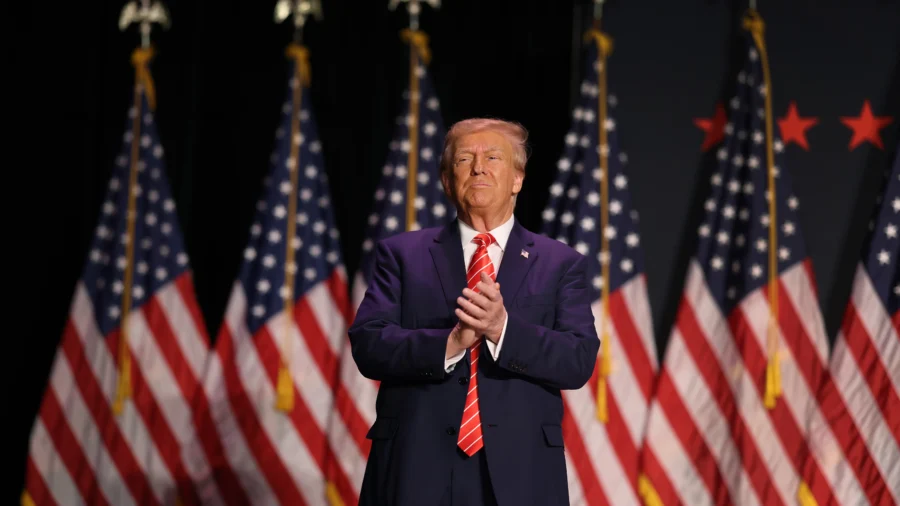FORT PIERCE, Fla.—U.S. District Judge Aileen Cannon heard arguments from special counsel Jack Smith’s office and attorneys for former President Donald Trump and co-defendants Walt Nauta, his butler, and Carlos De Oliveira, the Mar-a-Lago property manager, about the reviewing of evidence that may affect the case’s schedule.
The defendants were charged earlier this year with mishandling classified documents, and all have pleaded not guilty.
During the Wednesday hearing, Todd Blanche, attorney for President Trump, argued that “everything has changed” since the original trial date was set for this case.
The two main issues at hand are the volume of evidence and the fact that President Trump’s other criminal cases may likely overlap with this case schedule.
Discovery
The FBI raided Mar-a-Lago in August 2022, seizing classified documents and materials, leading to the indictment against President Trump and his two Mar-a-Lago staff.
Judge Cannon, presiding over the case, had earlier issued an order that the government pause using the materials it gathered in the raid, but the decision was overturned by an appeals court.
Given that classified documents are central to the case, the discovery process has involved the need to set up sensitive compartmented information facilities (SCIF) wherein the documents provided by the government can be reviewed by the defense. There is one set up in Miami but not in Fort Pierce, where the court and case reside.
So far, the government has provided 1.3 million pages of unclassified materials, 3,500 pages of classified material, and about 10 years’ worth of security footage.
Defense attorneys argued that they have not finished going through this volume of evidence and will still need to compel further discovery from the prosecution after an adequate review. The original deadline to file motions to compel was Oct. 20, which prompted the request for an extension.
They noted as an example that the files given to them included 60 terabytes of CCTV footage, which were sorted into zipped folders, and one of the folders had taken over 24 hours to unzip. Things like this added up to delay the defense’s access to review materials, they argued.
A total of 5,500 pages of classified documents with accompanying discs that hold audio recordings of transcripts included in those pages, as well as more than 3 gigabytes of emails.
Prosecutors argued that the CCTV footage amounts to 5 years rather than 10 years and directed the defense to only look at what they argued was “relevant” and the key dates of the case.
Mr. Blanche added that the material has been extraordinarily dense, and they expect to file motions to compel more evidence after they have digested all of it.
The judge asked how long it would take to complete a motion to compel without review of classified documents, and Mr. Blanche estimated two weeks, with a week for the special counsel’s office to respond.
Clearance
Further delaying matters is that not all parties have had the clearance to review materials when they were made available.
Mr. De Oliveira’s attorney John Irving got clearance to review classified materials on Oct. 11, and his local attorney Larry Murrell got clearance the same day as the hearing, on Nov. 1.
Mr. Nauta’s attorney, Stanley Woodward, said he has not yet been given clearance and so has not had the opportunity to enter the SCIF to review materials and discuss them with his client.
Earlier on Nov. 1, the judge had rejected the prosecutors’ motion for a blanket order that would prevent Mr. De Oliveira and Mr. Nauta from viewing classified documents and allow only their attorneys. Judge Cannon wrote in an opinion accompanying the order that the prosecutors’ interpretation of statutes was without merit and rejected their reading of “defendants” to mean only defendants’ attorneys and not the defendants themselves.
Multiple Trials
The trial for the classified documents case was originally scheduled to begin in May 2024.
President Trump is facing four criminal trials; one in New York is scheduled for March 25, 2024, and another federal case in Washington is set for March 4, 2024. Yet another state criminal case in Georgia has not had a trial schedule set yet.
Attorneys Mr. Blanche and Chris Kise argued for President Trump at the Nov. 1 hearing, and both of these attorneys are representing President Trump in other cases. Mr. Kise has been attending a civil trial in New York, in which President Trump is scheduled to testify on Nov. 6, and called in to the Florida hearing.
Mr. Blanche is representing President Trump in the case in Washington, also prosecuted by Mr. Smith’s office. He estimated this case would take two and a half months, with two weeks for President Trump to present his side.
He argued that the special counsel’s office made their schedule for a March 2024 trial date in the other case despite knowing the schedule for this case, and as it stands, President Trump could be facing three trials in as many months.
Prosecutors argued that it was President Trump’s own decision to choose to have the same attorney on multiple cases and showed little sympathy for what Mr. Kise described as an “extraordinarily challenging” effort to work on several overlapping cases. They said it was not surprising they were trying to move the trial until after the 2024 elections, but the other federal trial should not affect this schedule.
Judge Cannon ended the hearing by saying she would assess all the information and announce any changes to the schedule, if they are made, as soon as possible.
From The Epoch Times

